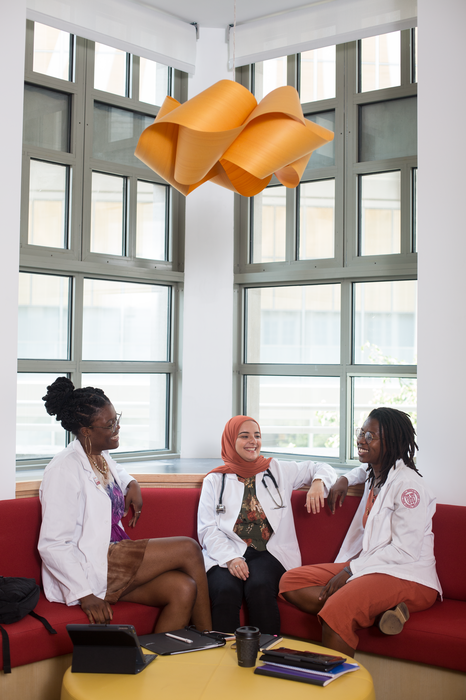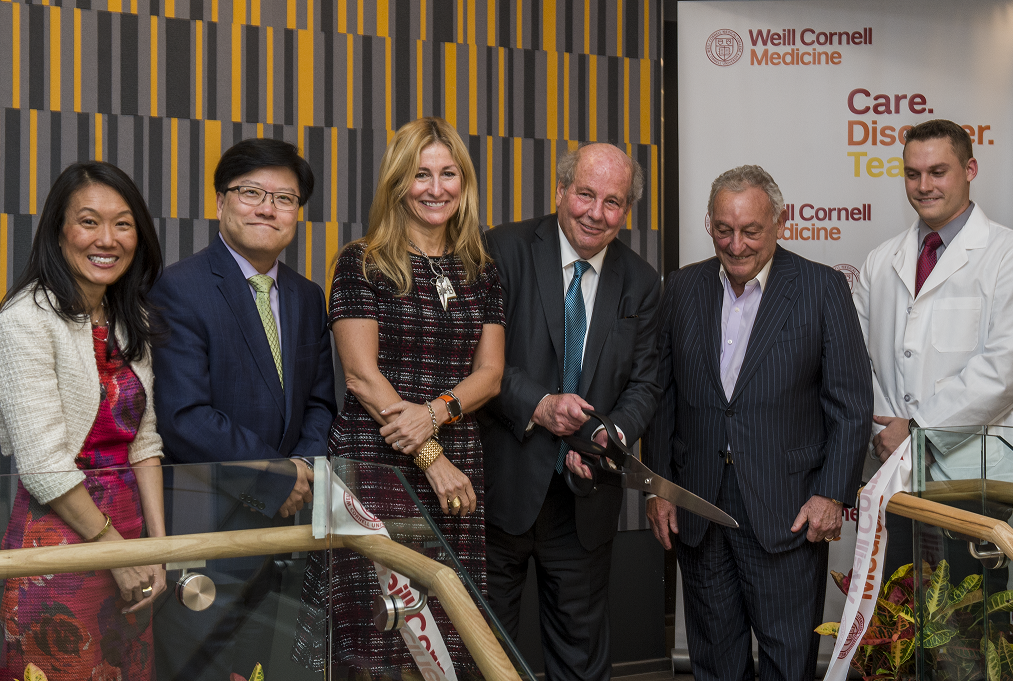Gary George just started his third year of medical school at Weill Cornell Medicine, but he’s already constantly on the go. When not in his clinical rotation, he’s meeting up with fellow classmates before setting aside time to get work done outside the hospital. He said he was always frustrated in past years by the lack of space dedicated to study groups, student activities or even a place to just grab a quick bite to eat in between.
That’s why he was excited to be at the unveiling of the new 16,200-square-foot Feil Family Student Center on campus, an interdisciplinary hub that is now home to small group study rooms, a student activity room, a computer lab, lounges and state-of-the-art instructional spaces. All spaces in the center feature flexible room configurations and enhanced information technology capabilities.
“To have a more available space that’s not a clinical space, that isn’t strictly an academic space where you can find some room to for five or six students to put down their laptops for group study, that is incredibly helpful,” said George, who also received a scholarship from the Feil family.
For George and his classmates, the new center fills a needed void. On Oct. 7, he stood before 81 fellow Weill Cornell Medicine students, faculty and senior leadership for a ribbon-cutting ceremony for the Feil Family Student Center, which occupies renovated first and second floors in the main campus buildings on York Avenue. The state-of-the-art center was made possible by a $12.5 million gift from the Feil Family.
“Students are the heart of this institution,” said Weill Cornell Medicine Vice Chair Overseer Jeffrey Feil. “You see their enthusiasm, you see their yearning to learn. They are so inspiring. The student center is yours to enjoy and we look forward to your bright future.”

Weill Cornell Medicine students Rinu Alakiu (left), Heba Shaaban (center) and Chimsom Orakwue (right) in the new Feil Family Student Center. Credit: Ashley Jones
The ribbon cutting was the last of a trio of events in the past month dedicated to enhancing student wellness. On Sept. 16, Weill Cornell Medicine announced that it has established a new scholarship program that will eliminate medical education debt for all students who qualify for financial aid. Later that week, Weill Cornell Medicine hosted the inaugural National Conference on Medical Student Mental Health and Well-Being, which highlighted the challenges to well-being in the medical school setting and identified innovative approaches to resilience training and mental health treatment that can be implemented as new best practices at medical schools around the country.
The Feil Family Student Center is now a critical cornerstone for Weill Cornell Medicine’s wellness efforts. It also supports the institution’s new medical curriculum, unveiled in fall 2014, which provides students with a hands-on, interactive education that integrates basic science with clinical care, and emphasizes the core principles of professionalism.
“Today’s event cements our approach to enhance the lives of our students by providing them 75 percent more space,” said Dr. Augustine M.K. Choi, the Stephen and Suzanne Weiss Dean of Weill Cornell Medicine. “Space to study, to lounge, to have a cup of coffee and have get-togethers with friends. I can’t thank Jeffrey Feil and the Feil family enough for making this happen.”
Dr. Yoon Kang, the acting senior associate dean for education, said that she knows firsthand how formative -- and demanding -- medical school can be.
“I also realize the positive impact the right learning and living environment can make in helping students get the most out of their time here,” she said. “A great shared space like this one nurtures learning and collaboration. It is also a place where students can relax and unwind, which is so important for their wellbeing and emotional health.”
Marcos Lu Wang, a second-year medical student in the class of 2022, was looking forward to the center’s opening. The ceremony was his first chance to really explore the center, having only seen it under construction over the past year.
“Before, it was sometimes difficult to study with a group, if it was just a quiet area, it was hard to ask questions,” Wang said. “Now we have a space to collaborate more easily.”
For him, the biggest appeal of the center is its ability to foster a sense of community.
“A collaborative study space really brings students together,” Wang said. “You get to mingle more with students from other class years, for instance; I don’t know the class above me or below me as well. Having a dedicated student center where you can relax—we all can get to know each other better.”

